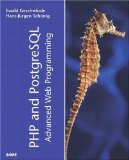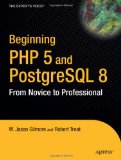 |
| | | | | | | | | | | | | | |
Glossary - PHP
PHP is a server-side scripting language that is specialized for the output of dynamic web site content. It is a popular language that has strong roots in Perl, a ubiquitous scripting language that has an extensive feature-set that PHP seems to strive to be similar to since many Perl modules have been converted for use by PHP scripts.
History
In the mid-1990s, a Perl programmer named Rasmus Lerdorf created a Perl CGI script which inserted a tag into the HTML code of his page, and collected the information on the visitors. He called the logging code PHP-Tools for "Personal Home Page," because for him the use was for his personal home page (although there is some debate about the name due to some users calling it "Perl Home Page"). A few inquires to Lerdorf asked how to get the tools, and so he generously decided to give it away for free.
In 1997, the first official non-alpha release of PHP was unveiled as PHP 3. It was a complete re-write in C by Andi Gutmans and Zeev Suraski, who found that PHP 2 was severely underpowered for developing an eCommerce application they were working on for a University project. Today, the syntax remains similar to that of Perl, albeit much more limited, simple, and somewhat inconsistent.
In 1999, PHP 4 was released after Andi Gutmans and Zeev Suraski re-wrote its core in order to address serious performance issues and modularize the code base. Although database interaction support was integrated in PHP 3, the additional support for more web servers, automatable HTTP-based session management, and output buffering introduced with the release of PHP 4 greatly improved the usefulness of PHP which in turn attracted new interest in PHP development.
| |||||
Since 2004, PHP 5 has gained much popularity due to yet another re-write of its core, which promises even better overall performance and compatibility, and continues to be a popular scripting language that is specialized for dynamic web site development.
Database integration
The MySQL database engine seems to be the most popular database that is supported and installed along-side PHP, but over the years there has been a lot of interest in PostgreSQL for a number of reasons, some of the most notable being that PostgreSQL has a reputation for its advanced featureset, high performance, massive scalability, and rock-solid reliability, all of which seem to be rivalled only by Oracle SQL Server and IBM DB2, both of which happen to be particularly well-respected in the banking, government, and military industries.
Despite a somewhat common belief, PHP supports many different database technologies, which means that the best database engine can be selected for each project.
See also
[Home] [Profile] [Glossary] [Library] [Resources] [Tools] [FAQ] [Site map] [Contact us]
Copyright © Inter-Corporate Computer & Network Services, Inc. All rights reserved.
All trademarks are the property of their respective owners.

